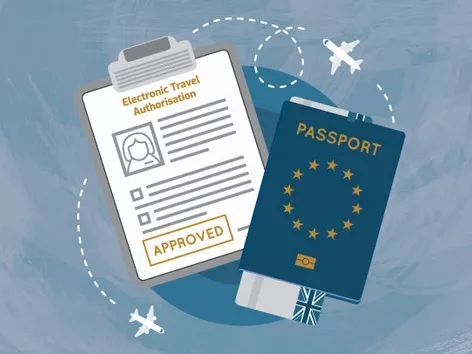How can a foreigner find a job in Great Britain: the most popular types of work visas, the top jobs in the United Kingdom for 2025 and useful tips
Table of contents
- Who is eligible to work in the UK without a work permit?
- What documents are required for employment in Great Britain?
- 1. Visa of a qualified worker
- 2. Visa of a medical worker
- 3. Global Talent visa
- 4. Visa for intra-company transfer
- 5. Seasonal work visa
- How to apply for a work visa to Great Britain?
- Confirmation of English language proficiency
- Features of the labor market of Great Britain
- Top in-demand professions for 2025
- Where can a foreigner find a job in the United Kingdom?
- How can a foreigner apply for a job in Great Britain?
- Useful information about working in Great Britain

The UK remains a popular destination for job seekers from all over the world. However, finding a job in the country for foreigners can still be challenging. Find out more about who is eligible to work in the UK without a work permit, what documents are required for employment, and the specifics of the UK labor market
Great Britain is a country with the fifth largest economy in the world and a low unemployment rate (about 3.7%). As an important center for business, the United Kingdom continues to be a popular destination for job seekers from many countries, especially since the country has a shortage of highly skilled personnel.
Every year, Britain issues about 600,000 work visas, in particular, many citizens of India, China, the USA and Turkey come to work in the country. However, finding employment in the United Kingdom is still a challenge for foreigners.
How can a foreigner find a job in Great Britain? A detailed guide from Visit World and lots of helpful tips below.
Who is eligible to work in the UK without a work permit?
Only citizens of the country have the right to work in Great Britain without a work permit.
After Brexit, EU representatives will also need to obtain a visa to work in the country. An exception is made only for persons who lived in Great Britain before the decision on Brexit and received "settled status".
What documents are required for employment in Great Britain?
Representatives of the rest of the world must obtain a visa to work in Great Britain. There are many different types of work visas approved in the United Kingdom (about 27 in total), so before you apply, you need to choose the permit that is right for you. The most common work visas in Great Britain include:
1. Visa of a qualified worker
Allows a foreign national to be sponsored by a chosen company and move to work in the UK. Before a foreigner can apply for this visa, a UK business must provide a confirmed job offer.
Not all jobs are suitable for obtaining a visa of this type, the following can obtain a highly qualified worker visa: medical workers, scientists, engineers, IT specialists, psychologists, lawyers, journalists, etc. The salary level must also be a minimum of £26,200 per annum.
Visa features
The permit is issued for up to 5 years, after which you can apply for a permanent residence document. You will need to prove your English fluency. This visa expires if you change employers.
2. Visa of a medical worker
The permit is designed specifically for doctors, nurses, social workers, health care providers, or other health care professionals. As with the skilled worker visa, you will need a confirmed job offer before you can apply for this visa. Minimum salary £20,960 per annum.
Visa features:
Issued for up to 5 years. The permit is canceled if the expat changes company. After 5 years, a foreigner will be able to apply for a permanent residence document.
3. Global Talent visa
Enables leaders and talented professionals in the arts, culture, technology or science to immigrate to the UK. To apply, an expat must first obtain proof of exceptional talent or promise in your field, and approval from an approved body (eg Tech Nation, British Academy, Royal Academy of Engineering). There are no minimum wage requirements.
Visa features:
It is allowed to live and work for up to 5 years. You can extend this visa or apply for permanent residence.
4. Visa for intra-company transfer
The Intra-Company Transfer (ICT) visa is for employees of multinational companies transferring to a branch in the UK. Key expat requirements: employment with the company for at least 12 months prior to transfer (if salary level is greater than £73,900 then no employment period requirement). In addition, you must have a certificate of sponsorship from your employer. The minimum wage is £42,400 per annum.
5. Seasonal work visa
A seasonal work visa is available to individuals who wish to work in the UK agricultural sector for up to six months. To be approved, you must have an offer from a licensed sponsor and proof that you have sufficient funds to support yourself (£1,270 in your bank account within 28 days).
Read more about the available types of work permits in Great Britain at the link.
How to apply for a work visa to Great Britain?
The visa application process usually includes the following steps:
1. Find a job.
2. Get your Certificate of Sponsorship (CoS).
3. Prepare your application: collect the necessary documents such as your CoS, proof of qualifications and proof of English proficiency.
4. Apply online.
5. Pay the fees: The cost of the visa depends on the type and duration and ranges from £259 to £1,400.
6. Visit the visa center to provide fingerprints and a photo.
7. Wait for a decision: Work visa applications in the UK usually take up to 8 weeks to be processed.
Confirmation of English language proficiency
To be employed in the UK, you must prove that you can speak, read, write and understand English at B1 level according to the Common European Framework of Reference for Languages (CEFR). In particular, take English language tests such as IELTS and TOEFL.
Citizens of certain nationalities, such as representatives of Australia, Jamaica and the USA, are exempt from the above requirements.
For detailed information on language requirements, recognized English language tests and other criteria for people wishing to live in the UK, please visit GOV.UK - Settle in the UK.
Features of the labor market of Great Britain
Although the UK offers decent job opportunities, the country still suffers from a shortage of highly skilled workers. This trend allows many foreigners to apply for their dream job.
Of course, the competition remains quite high, but with the necessary experience, qualifications, professional qualities and knowledge of the language, finding a job in the United Kingdom is quite possible.
The main sectors of the economy of Great Britain in which the largest number of jobs are concentrated are:
1. STEM (Science, Technology, Engineering, Mathematics): The UK's growing investment in research and innovation has led to a shortage of skilled professionals in engineering, data science and IT. These positions are accompanied by an attractive salary.
2. Artificial intelligence (AI) and machine learning. With the rise of artificial intelligence in the UK, data analytics and machine learning experts are in high demand, with competitive salaries and career opportunities.
3. Professions in the field of health care. An aging population and growing healthcare needs have led to a shortage of healthcare workers, including doctors, nurses and medical technicians.
4. Construction and skilled trades: The UK has a shortage of construction workers, electricians and plumbers. To meet the demand, the government is actively recruiting qualified specialists from abroad.
Top in-demand professions for 2025
Several professions are in high demand and offer attractive salary packages and sponsorship opportunities to professionals:
- Software Engineers: (salary range £40,000 to £100,000).
- Data Scientists (salary range: £45,000 to £85,000).
- Nurses (salary range: £27,000 - £50,000).
- Civil Engineers (salary range: £30,000 to £70,000).
- AI Specialists (salary range: £50,000 to £90,000).
- Teachers (salary range: £25,000 to £60,000).
- Healthcare Assistants (salary range: £18,000 to £30,000).
- Electricians (salary range: £25,000 to £45,000).
- Pharmacists (salary range: £35,000 to £55,000).
In order to safely move, travel or work in a new country, you will need health insurance. You can issue an extended policy on our website using the link.
Where can a foreigner find a job in the United Kingdom?
There are many ways to find work in the UK. Depending on the industry and specific position, you can choose one of the options or combine all of them at once.
1. Search the Internet - thousands of new jobs in a variety of sectors, both full-time and part-time, appear daily on specialist websites. Usually, you can simply upload your resume to a certain website and apply for a job in just a few clicks.
- Popular job search portals in Great Britain: Adecco, Adzuna, Careerbuilder, CV Library, Everyjobsite, Gumtree, Indeed, Jobsite, Monster, Reed, Totaljobs and others.
- Specialized websites, depending on the industry:
Caterer - Hospitality and catering
Charityjob - Charity
Computer Weekly - IT
Design Week - Design and graphics
Hays - Management
Justengineers – Engineering
Madjobs - Marketing and Advertising
NHSjobs - National Health Service
Prospects - Jobs for university graduates
2. Specialist staffing agencies – most staffing agencies often specialize in a specific sector and assist in finding both permanent and temporary work.
3. Company websites – browse the websites of employers that interest you. Information about open vacancies at the company is often posted on them. If recruitment is not currently underway, you can simply leave your contact details.
4. Social Media – Social media platforms are also great for connecting with like-minded professionals. All you have to do is create an account and start searching for people you met at a previous job or who can help you in your job search in some way.
5. Self-employment and freelancing – you also have the right to start your own business or register as self-employed, provided you have the appropriate visa.
With an estimated 4.2 million registered self-employed workers in the UK by 2023, it is a popular source of income for many workers.
If you decide to open your own business, you can be an individual entrepreneur or register as a limited liability company.
How can a foreigner apply for a job in Great Britain?
The job application process will vary depending on the job a foreigner is applying for, but generally you will need to take the following steps:
1. Start looking for a job using the methods above.
2. Make sure you have the right experience and qualifications – Once you've found a position that suits you, check that you have the right experience and qualifications for the job. At this stage, you will be able to clearly understand what you need to get your dream job and what steps you need to take before applying.
3. Start collecting the documents you need to apply - find out what you need to provide to the employer, for example, references from a previous place of work, etc.
4. Prepare a separate resume for each vacancy - this will show the employer that you spent time and effort on the application and will help you stand out among other candidates. Similar rules apply to the cover letter. Make sure you personalize the document and explain why you want to work for this particular company.
5. Prepare for the interview stage – If your initial application is accepted, you will proceed to the interview stage. Currently, they are most often held online. Be sure to take the time to properly prepare for your interview so that you appear professional and confident. Think about what questions you might be asked, and be sure to write down the questions that interest you.
Useful information about working in Great Britain
- The duration of the working week is 40 hours. People usually work from 9 am to 5 pm on weekdays.
- Most UK companies and organizations still have a clear hierarchy where key decisions are made by managers and other senior staff.
- To work in the UK, you need a Tax Identification Number (UTR) - this is a 10-digit social security number. You will need to apply for it before starting work.
- To open a bank account, you will need proof of address, a certificate of income or a certified letter from your company and a passport.
Getting a job in the UK can be difficult for a foreigner, but living in the country has many advantages. The most important thing you need to do before applying is to find out what documents you need to work in the UK.
We will remind you! The UK government is working on digitizing the border and immigration system. As part of the program, the eVisa system was introduced, to which expats were required to switch by the end of 2024. We have already told you what this new program is and which of the foreigners need to switch to eVisa.
Igor Usyk - Head of Migration department at VisitWorld
To ensure a safe move to a new country, I advise you to consult a specialist. My colleagues, qualified specialists with a legal education, will help you avoid unpleasant situations during migration.
Products from Visit World for a comfortable trip:
Checklist for obtaining a visa and necessary documents in Great Britain;
Legal advice on immigration to Great Britain;
Travel insurance for foreigners in Great Britain;
Medical insurance all over the world.
We monitor the accuracy and relevance of our information. Therefore, if you see any error or discrepancy, please write to our hotline.
Recommended articles
2 min
Travels
The UK Home Office has expanded the list of countries whose citizens now need an ETA to enter the UK. In particular, the changes affect representatives of the USA, Canada, Australia and EU countries. Find out what this document is and how to get an ETA
05 mar. 2025
More details3 min
Residence permit
EB2 NIW: Frequently Asked Questions
The EB2 NIW visa allows foreign professionals whose work is in the national interest of the United States to obtain work authorization under a simplified procedure. We have collected answers to the most common questions related to this permission in this article
20 wrz. 2024
More details2 min
Expats
Domicile vs. Residency: What is the Difference?
The terms "Domicile" and "Residence" are concepts that are often used interchangeably and taken for the same thing. However, they have different legal definitions and implications. Learn the difference between these two definitions
23 wrz. 2024
More details3 min
Expats
Living in Malta as an expat: pros and cons, cost of living and employment prospects
Malta is a country in Europe that boasts a wonderful climate, rich architecture and a measured lifestyle. Also, this island state is a promising destination for employment and starting a business. Find out what the pros and cons of moving to Malta are, what the cost of living is and where most of the island's expats work
23 wrz. 2024
More detailsAll materials and articles are owned by VisitWorld.Today and are protected by international intellectual property regulations. When using materials, approval from VisitWorld.Today is required.
